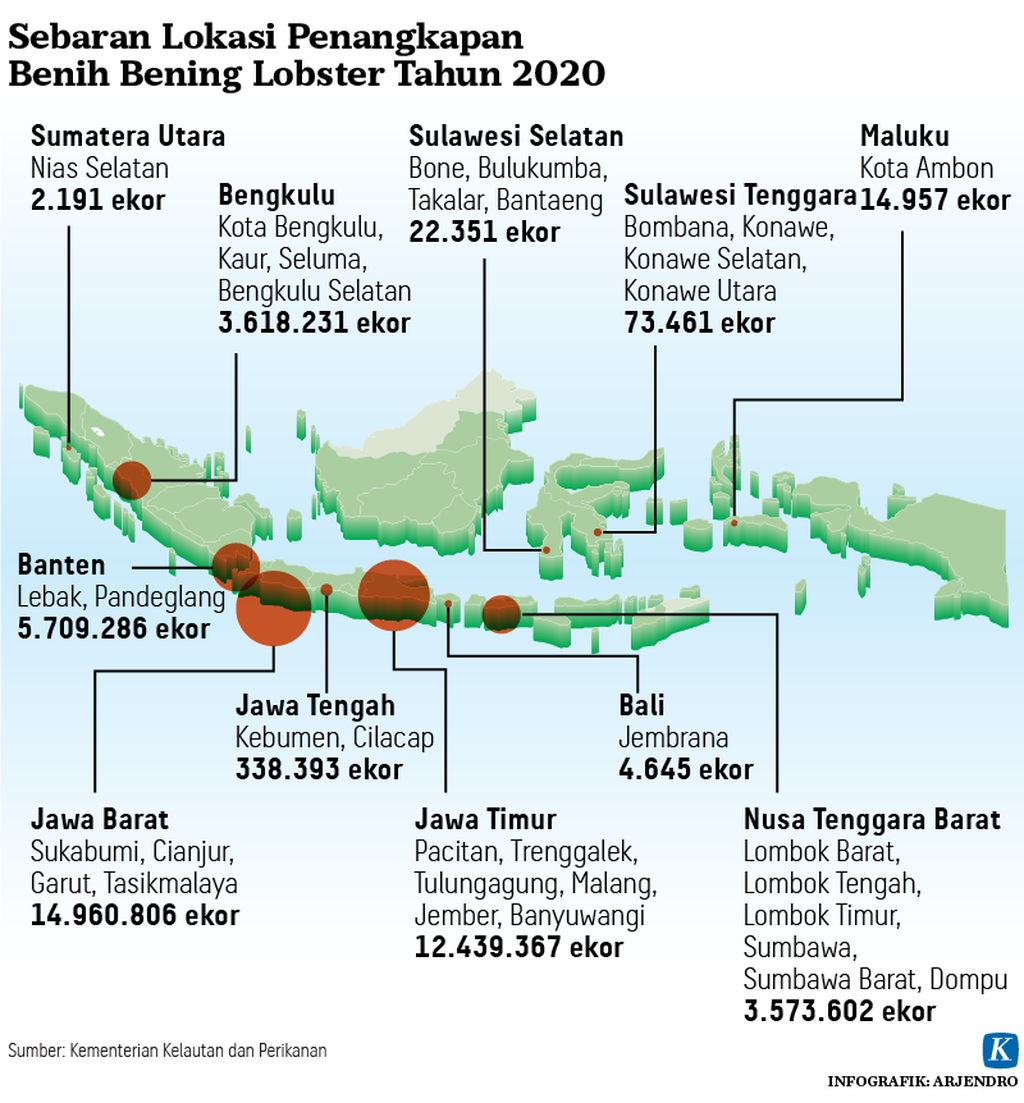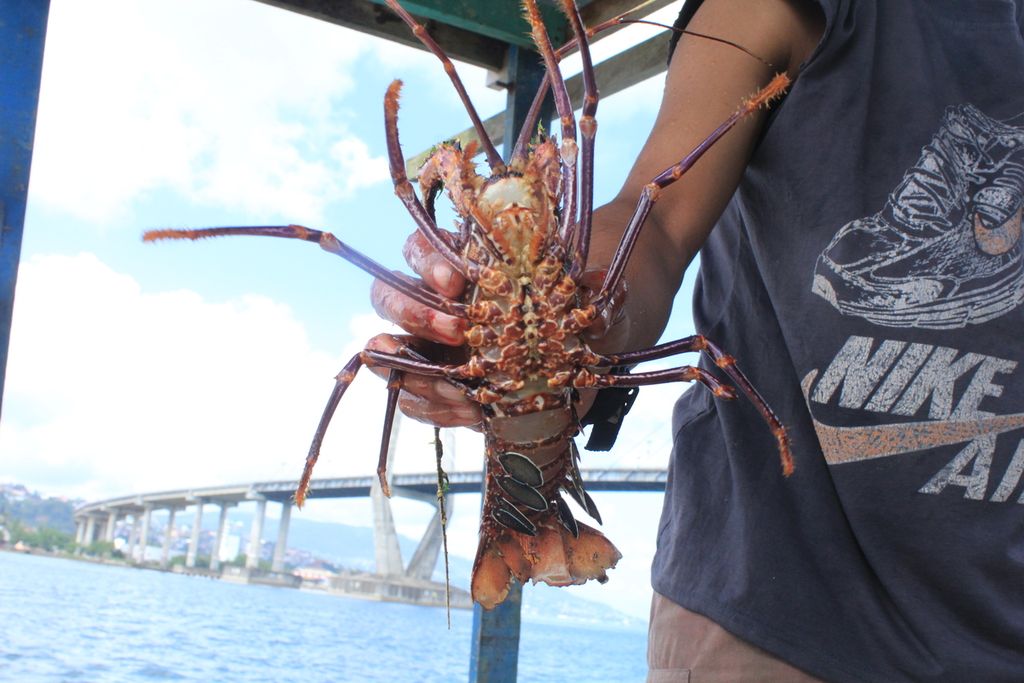It is feared that the government’s plan to allow the export of clear lobster seeds again, even through a cooperation scheme with foreign investors, will hit domestic lobster cultivation.
JAKARTA, KOMPAS — Several groups have highlighted the government’s plan to reopen the export of clear lobster seeds through a cultivation investment cooperation scheme. Exporting clear lobster seeds will open up opportunities for lobsters to be cultivated abroad by investors who cultivate lobsters in Indonesia.
Lobster is one of the five main aquaculture fishery commodities promoted by the government in the blue economy based work program. Apart from lobster, the leading commodities for cultivation are shrimp, crab, tilapia and seaweed.
The clear lobster seed export policy has been open and closed. Currently, the export of lobster seeds is prohibited, as stated in Minister of Maritime Affairs and Fisheries Regulation Number 17 of 2021 concerning Management of Lobster (Panulirus spp), Crabs (Scylla spp), and Crab (Portunus spp) in the Territory of the Republic of Indonesia. This regulation revises Minister of Maritime Affairs and Fisheries Regulation No. 12/2020 which, among other things, opens permits for the export of clear lobster seeds.
Adviser of the Indonesian Aquaculture Association (Hibilindo), Effendy Wong, revealed that the government’s plan to allow the export of lobster seeds through a partnership scheme with foreign investors, is feared to affect the growing lobster aquaculture industry in the country. The opening of the lobster seed export market does not guarantee that local farmers will have easy and affordable access to lobster seeds.
Based on the Draft Regulation of the Minister of Maritime Affairs and Fisheries concerning the Catching, Cultivation and Management of Lobsters (Panulirus spp), Crabs (Scylla spp), and Crab (Portunus spp i>), Article 6 states that the cultivation of clear lobster seeds carried out outside the Republic of Indonesia is carried out by investors who also cultivate fish in Indonesia. Investors are lobster cultivation business actors who have been registered in the investor’s country of origin and collaborate with public service agencies in the field of aquaculture.
“If this regulation is enforced, then it is clear that it will encourage lobster cultivation abroad without considering the actual development of cultivation in the country. This will slowly kill local cultivators,” said Effendy, when contacted on Sunday (1/10/2023).
On the other hand, Effendy added that foreign investors who engage in cultivation partnership schemes are feared to be more likely to enlarge their cultivation overseas rather than in Indonesia. This is due to the absence of investor obligation to establish a “mentoring” scheme for the advancement of lobster cultivation in Indonesia. The plan to export transparent lobster seeds is also viewed as contradictive to President Joko Widodo’s mandate to accelerate the downstreaming and value-added of Indonesia’s commodities.
“The export of transparent lobster seeds for the benefit of foreign investors is equivalent to the export of raw materials. This goes against the issue of downstreaming initiated by the President,” he stated.
Executive Director of the Maritime Center for Humanitarian Studies, Abdul Halim, expressed caution regarding the government’s policy implementation that lacks scientific basis and is prone to violations. Regulations regarding foreign investors must focus on domestic cultivation to avoid over-exploitation of clear seed lobsters being transported to their respective home countries instead of being raised in Indonesia. On the other hand, the majority of domestic cultivators are at risk of running out of affordable lobster seed stocks.
“Amidst suboptimal organizational and budgeting capacity, the supervision of the quantity of stock (lobster seeds) taken and remaining is still weak,” said Halim.
Professor of Fisheries Resource Management, Faculty of Fisheries and Marine Sciences, IPB University, Luky Adrianto, assessed that exports of natural resources, including clear lobster seeds, are not the only economic instrument between countries. Lobster resources as natural capital should be developed with added value domestically.
Optimal utilization of lobster resources requires a comprehensive approach, such as aquaculture activities, capture fisheries, and increasing added value through the development of area-based lobster cultivation (lobster aquaculture estate/LAE) in the country. The government needs to encourage LAE investment cooperation in the country by providing a conducive lobster business ecosystem, increasing human resource capacity and technology.

“The development of lobster cultivation through LAE should ideally be carried out domestically with a sales scheme of mature lobsters through partner countries with export quota agreements for mature lobsters regulated by the state, taking into account the proportional investment of natural resources and technology,” said Luky.
Previously, the Director General of Aquaculture Ministry of Maritime Affairs and Fisheries (KKP) TB Haeru Rahayu, when confirmed regarding the investment cooperation plan for lobster cultivation, said that his party was still reviewing policies from various aspects. “Essentially, we are currently working on and reviewing various aspects, both technical and regulatory aspects,” he said some time ago.
In the working meeting of Commission IV of the Indonesian House of Representatives with the Minister of Maritime Affairs and Fisheries at the end of August 2023, one of the concluding points was that Commission IV encourages the Ministry to cultivate lobster farming domestically as a solution to the policy prohibiting the export of lobster seeds abroad for the welfare of the community.
Minister of Maritime Affairs and Fisheries Sakti Wahyu Trenggono has revealed that the ministry is currently evaluating the volume of transparent lobster seeds produced annually in each production region. The potential for this seed is enormous. Vietnam is the main market for transparent lobster seeds, with a demand of 600 million seeds, almost entirely supplied by Indonesia. With an average selling price of $2 per seed, the value of seeds taken from Indonesia amounts to nearly $1.2 billion US dollars.
Therefore, in a meeting with the Government of Vietnam, among other things, it conveyed the opportunity for lobster cultivation in Indonesia. Hopefully, in the next five years, Indonesia will become the largest producer of lobsters. “I said, come to Indonesia. I will prepare the red carpet for you to cultivate here. We guarantee seed certification so they are enthusiastic about doing it,” he said.
According to Sakti, Indonesia has the capability to develop lobster cultivation. As an example, in Rotendau, East Nusa Tenggara, pearl lobster cultivation has already developed without foreign investment. The lobster cultivation feed used among other things, imitates the feed used in Vietnam.
Sumber: https://www.kompas.id/baca/english/2023/10/01/en-budidaya-lobster-dikhawatirkan-kembali-lesu

Add a Comment